初一英语作文常用单词
常用初中英语写作词汇集锦

常用初中英语写作词汇集锦无论是用英语写作文还是记英语单词都需要记忆,小编下面就给大家分享实用的英语,学习一下提升成绩吧表示递进关系的关键词语Additionally 加之;又besides 此外;除……之外equally important 同样重要的是furthermore 此外;而且in addition 另外in other words 换句话说last but not least 最后但同样重要的是moreover 而且;此外that is say 即;就是;换句话说交通、保险fully comprehensive insurance 全险third-party insurance 第三者伤亡保险life insurance 人身险accident insurance 事故险insurance against theft 防盗窃险no-claims bonus 因未申报而扣除的保险赔偿kind of 与kinds of1kind of 单独用,表示“有点”,后接形容词或副词:He is kind of thin.”他有点瘦” I feel kind of hungry.”我有点饿”Uncle Wang speaks kind of quickly. 王叔叔说得有点快。
2若kind of前有a, this, that, what等,译为“种,种类” 后加名词。
That kind of question is difficult to answer. 那类问题难回答。
What kind of sport do you like best? 你最喜欢何种运动?3熟记一些短语:all kinds of...“各种各样的...” many kinds of“很多种类的”different kinds of“不同种类的” 后都加名词。
英语作文万能单词

1.Essential表示某事物是必需的或基本的。
2.Innovative描述新颖或创新的事物。
3.Catalyst指促进变化或发展的因素。
4.Diverse表示多样性或不同种类的集合。
5.Dynamic描述充满活力或不断变化的事物。
6.Coherent指有逻辑或组织性的事物。
7.Eloquent描述表达能力强或有说服力的。
8.Resilient描述能够快速恢复或适应变化的。
9.Intuitive表示直观的或本能的理解。
10.Pivotal指关键的或转折点。
11.Ethical描述道德上正确的或有道德标准的行为。
12.Sustainable指能够长期维持或不损害环境的。
13.Collaborative描述需要合作或团队工作的行为。
14.Holistic表示全面的或考虑所有方面的。
15.Empirical基于观察或实验证据的。
16.Intrinsic指固有的或内在的。
17.Paradigm指一种模型或框架,通常用于描述思想或行为模式。
18.Synergistic描述不同元素或因素相互作用产生更大效果的情况。
19.Adaptive描述能够适应新环境或条件的。
20.Pioneering指开创性的或创新的。
21.Interdisciplinary涉及多个学科或领域的。
22.Evolve描述事物随着时间的推移而发展或变化。
23.Conducive有助于或促进某事发生的。
24.Hypothesize形成或提出假设。
25.Incorporate包含或融入。
26.Facilitate使某事更容易或促进。
27.Interact描述事物之间的相互作用。
28.Optimize使某物达到最佳状态或效率。
29.Perpetuate使某事持续或永久存在。
30.Revolutionize彻底改变或革新。
31.Substantiate用证据支持或证明。
32.Transcend超越常规或限制。
33.Viable可行的或能够生存的。
英语作文单词

英语作文单词在英语作文中,使用恰当的词汇是非常重要的。
以下是一些常用的英语作文单词,可以帮助你提高写作水平:1. Academic Vocabulary (学术词汇)- Analyze (分析)- Hypothesize (假设)- Synthesize (综合)- Evaluate (评估)2. Descriptive Adjectives (描述性形容词)- Spectacular (壮观的)- Serene (宁静的)- Ambiguous (模糊的)- Exquisite (精致的)3. Linking Words (连接词)- Furthermore (此外)- However (然而)- Therefore (因此)- Consequently (结果)4. Transition Words (过渡词)- Additionally (另外)- Nonetheless (尽管如此)- Meanwhile (与此同时)- Alternatively (或者)5. Adverbs of Degree (程度副词)- Significantly (显著地)- Gradually (逐渐地)- Largely (大部分)- Partially (部分地)6. Nouns for Writing (写作名词)- Perspective (视角)- Argument (论点)- Narrative (叙述)- Conclusion (结论)7. Verbs for Essays (论文动词)- Illustrate (说明)- Assert (断言)- Propose (提议)- Elaborate (详细说明)8. Common Collocations (常用搭配)- Make a difference (产生影响)- Come to a conclusion (得出结论) - Deal with (处理)- Focus on (集中于)9. Phrasal Verbs (短语动词)- Look into (调查)- Come across (偶遇)- Carry out (执行)- Break down (分解)10. Idiomatic Expressions (习语表达)- Break the ice (打破沉默)- Bite the bullet (硬着头皮)- The ball is in your court (球在你的场地,即由你决定)使用这些单词时,注意它们在句子中的恰当位置和语法结构。
初中英语作文必背单词
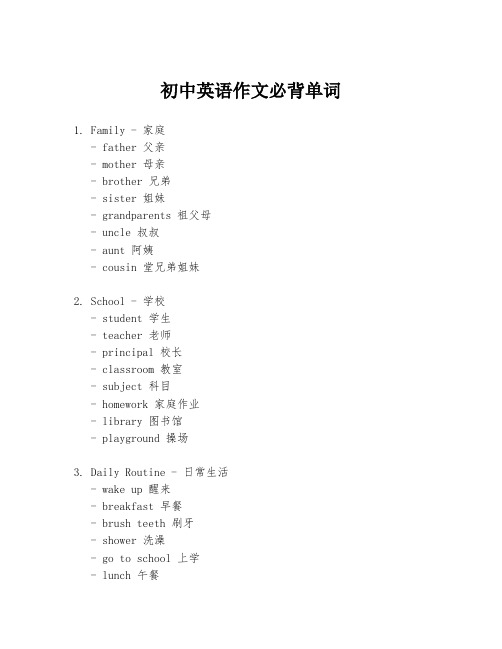
初中英语作文必背单词1. Family - 家庭- father 父亲- mother 母亲- brother 兄弟- sister 姐妹- grandparents 祖父母- uncle 叔叔- aunt 阿姨- cousin 堂兄弟姐妹2. School - 学校- student 学生- teacher 老师- principal 校长- classroom 教室- subject 科目- homework 家庭作业- library 图书馆- playground 操场3. Daily Routine - 日常生活- wake up 醒来- breakfast 早餐- brush teeth 刷牙- shower 洗澡- go to school 上学- lunch 午餐- homework 家庭作业- dinner 晚餐- sleep 睡觉4. Food and Drink - 食物和饮料 - apple 苹果- banana 香蕉- bread 面包- rice 米饭- milk 牛奶- juice 果汁- water 水- ice cream 冰淇淋5. Clothing - 服装- shirt 衬衫- pants 裤子- dress 连衣裙- skirt 裙子- shoes 鞋子- socks 袜子- hat 帽子- coat 大衣6. Weather - 天气- sunny 晴朗的- rainy 下雨的- cloudy 多云的- windy 有风的- snowy 下雪的- hot 热的- warm 温暖的7. Travel - 旅行- travel 旅行- plane 飞机- train 火车- bus 公共汽车- taxi 出租车- hotel 酒店- map 地图- tourist 游客8. Hobbies - 爱好- reading 阅读- painting 绘画- dancing 跳舞- singing 唱歌- playing sports 运动 - collecting 收集- gardening 园艺- cooking 烹饪9. Time - 时间- morning 早上- afternoon 下午- evening 晚上- night 夜晚- today 今天- tomorrow 明天- yesterday 昨天- month 月- year 年10. Adjectives - 形容词 - happy 快乐的- sad 悲伤的- tired 疲倦的- hungry 饥饿的- thirsty 口渴的- big 大的- small 小的- fast 快的- slow 慢的11. Prepositions - 介词 - in 在...里面- on 在...上面- under 在...下面 - over 在...上方- behind 在...后面 - next to 在...旁边 - between 在...之间 - with 带有12. Numbers - 数字- one 一- two 二- three 三- four 四- five 五- seven 七- eight 八- nine 九- ten 十13. Colors - 颜色 - red 红色- blue 蓝色- green 绿色- yellow 黄色 - black 黑色- white 白色- purple 紫色 - orange 橙色 - pink 粉色14. Animals - 动物 - dog 狗- cat 猫- bird 鸟- fish 鱼- horse 马- tiger 老虎- elephant 大象 - monkey 猴子 - snake 蛇15. Jobs - 职业- doctor 医生 - nurse 护士- teacher 老师- farmer 农民- engineer 工程师- artist 艺术家- musician 音乐家- scientist 科学家- pilot 飞行员这些单词是初中英语作文中常见的词汇,掌握它们有助于提高写作能力。
英语作文常用的单词
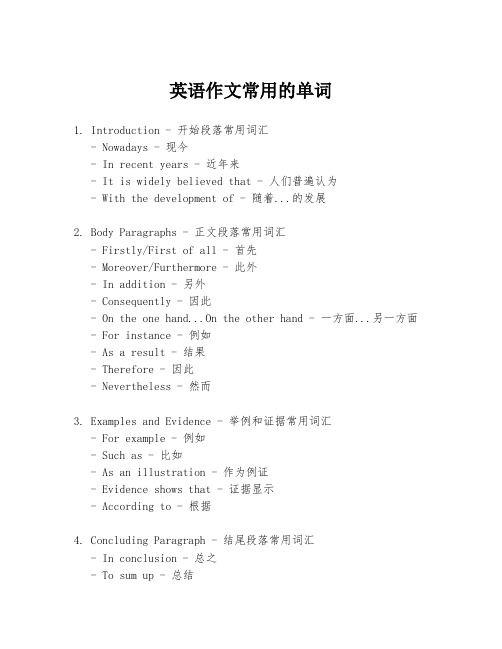
英语作文常用的单词1. Introduction - 开始段落常用词汇- Nowadays - 现今- In recent years - 近年来- It is widely believed that - 人们普遍认为- With the development of - 随着...的发展2. Body Paragraphs - 正文段落常用词汇- Firstly/First of all - 首先- Moreover/Furthermore - 此外- In addition - 另外- Consequently - 因此- On the one hand...On the other hand - 一方面...另一方面 - For instance - 例如- As a result - 结果- Therefore - 因此- Nevertheless - 然而3. Examples and Evidence - 举例和证据常用词汇- For example - 例如- Such as - 比如- As an illustration - 作为例证- Evidence shows that - 证据显示- According to - 根据4. Concluding Paragraph - 结尾段落常用词汇- In conclusion - 总之- To sum up - 总结- In summary - 总的来说- All in all - 总的来说- Therefore - 因此- It can be concluded that - 可以得出结论5. Opinions and Views - 观点和看法常用词汇- I believe that - 我认为- It is my view that - 我的看法是- In my opinion - 在我看来- Personally - 个人而言- From my perspective - 从我的角度来看6. Causation and Effect - 因果关系常用词汇- Because - 因为- Due to - 由于- Owing to - 由于- As a result of - 由于- Consequently - 因此7. Comparison and Contrast - 比较和对比常用词汇 - Similarly - 同样地- In contrast - 相比之下- On the contrary - 相反- Whereas - 然而8. Emphasis - 强调常用词汇- Indeed - 的确- Undoubtedly - 毫无疑问- Notably - 值得注意的是- Particularly - 特别地9. Transition Words - 过渡词汇- However - 然而- Nevertheless - 尽管如此- Thus - 因此- Hence - 因此10. Time and Sequence - 时间和顺序常用词汇- Firstly - 首先- Subsequently - 随后- Then - 然后- Finally - 最后11. Conditional and Hypothetical - 条件和假设常用词汇 - If - 如果- Provided that - 假设- In case - 如果- Unless - 除非12. Generalization and Specificity - 概括和具体常用词汇 - Generally speaking - 一般而言- Specifically - 具体来说- In particular - 特别地- For example - 例如13. Agreeing and Disagreeing - 同意和不同意常用词汇- I agree that - 我同意- I disagree with the idea that - 我不同意- On the contrary - 相反- I concede that - 我承认14. Defining and Describing - 定义和描述常用词汇- Definition - 定义- Characteristic - 特点- Essentially - 本质上- In essence - 本质上15. Problem and Solution - 问题和解决方案常用词汇- Problem - 问题- Issue - 问题- Dilemma - 困境- Solution - 解决方案- Remedy - 补救措施这些单词和短语是英语作文中非常有用的工具,可以帮助你构建清晰、有逻辑的文章结构,并有效地表达你的观点。
英语作文万能单词

英语作文万能单词Certainly! Here's a list of versatile English words that can be used to enhance your essay writing skills:1. Invariably - Always; without fail.2. Expedite - To speed up or hasten.3. Catalyst - A person or thing that precipitates an event.4. Pernicious - Causing severe harm or damage.5. Ameliorate - To make something better or improve.6. Conundrum - A puzzle or problem with no obvious solution.7. Ineffable - Too great or extreme to be expressed in words.8. Plagiarize - To use someone else's work or ideas without giving credit.9. Paradigm - A typical example or pattern of something.10. Discern - To recognize or identify something.11. Intrinsic - Belonging naturally; essential.12. Exacerbate - To make a problem or bad situation worse.13. Aesthetic - Concerned with beauty or the appreciation of beauty.14. Ameliorate - To improve or make better.15. Anomaly - Something that deviates from what is standard, normal, or expected.16. Augment - To increase or add to the size or extent of something.17. Credence - Acceptance that something stated or alleged is true or genuine.18. Dichotomy - The existence of two opposing sides or types.19. Egregious - Outstandingly bad or shocking.20. Hypothesis - A supposition or idea that is not yet verified or proven.21. Inevitable - Bound to happen; unavoidable.22. Juxtapose - To place or position close together or side by side for comparison.23. Kaleidoscope - A constantly changing pattern or series of events.24. Lethargic - Lacking energy and feeling tired.25. Malleable - Capable of being shaped or bent.26. Nuance - A subtle difference in meaning, opinion, or attitude.27. Obfuscate - To make something less clear or moredifficult to understand.28. Paradox - A statement or situation that seems to contradict itself but may nonetheless be true or valid.29. Quandary - A state of uncertainty or perplexity.30. Resilience - The capacity to recover quickly from difficulties.Using these words effectively can elevate the sophistication of your writing and help you articulate complex ideas more precisely. Remember, context is key, and it's important to understand the meaning and usage of each word to avoid misapplication.。
[英语作文]100个英语单词摘抄
![[英语作文]100个英语单词摘抄](https://img.taocdn.com/s3/m/fe85a2920d22590102020740be1e650e52eacf87.png)
[英语作文]100个英语单词摘抄1. Abundance - 丰富2. Achievement - 成就3. Admiration - 钦佩4. Adventure - 冒险5. Advertisement - 广告6. Agreeable - 令人愉快的7. Ambition - 抱负8. Analyze - 分析9. Anticipation - 预期10. Anxiety - 焦虑11. Apologize - 道歉12. Appreciate - 欣赏13. Approval - 批准14. Assurance - 保证15. Attention - 注意16. Attraction - 吸引17. Benefit - 利益18. Boldness - 大胆19. Comfort - 舒适20. Communication - 沟通21. Compliment - 恭维22. Concentration - 集中23. Cooperation - 合作24. Creativity - 创造力25. Curiosity - 好奇心26. Determination - 决心27. Disappointment - 失望28. Enthusiasm - 热情29. Emotion - 情感30. Empathy - 同情31. Energy - 能量32. Enthusiasm - 热情33. Excitement - 兴奋34. Fascination - 魅力35. Gratitude - 感激36. Humor - 幽默37. Imagination - 想象38. Independence - 独立39. Influence - 影响40. Initiative - 主动性41. Inspiration - 灵感42. Intelligence - 智慧43. Joy - 快乐44. Judgment - 判断45. Knowledge - 知识46. Love - 爱47. Motivation - 动机48. Opportunity - 机会49. Patience - 耐心50. Perseverance - 坚持51. Perspective - 观点52. Positivity - 积极性53. Pride - 自豪54. Quality - 质量55. Recognition - 认可56. Respect - 尊重57. Responsibility - 责任58. Satisfaction - 满意59. Sincerity - 真诚60. Stability - 稳定61. Strength - 力量62. Success - 成功63. Talent - 才能64. Trust - 信任65. Understanding - 理解66. Value - 价值67. Vision - 视野68. Wisdom - 智慧69. Wonder - 惊奇70. Zeal - 热情71. Ability - 能力72. Accomplishment - 成就73. Advice - 建议74. Affection - 喜爱75. Alertness - 警觉76. Analysis - 分析77. Anxiety - 焦虑78. Awareness - 意识79. Bias - 偏见80. Courage - 勇气81. Dedication - 奉献82. Determination - 决心83. Devotion - 忠诚84. Diligence - 勤奋85. Dignity - 尊严86. Empathy - 同情87. Encouragement - 鼓励88. Enthusiasm - 热情89. Fairness - 公平90. Generosity - 慷慨91. Honesty - 诚实92. Humility - 谦逊93. Imagination - 想象94. Innovation - 创新95. Integrity - 正直96. Kindness - 善良97. Leadership - 领导力98. Maturity - 成熟99. Optimism - 乐观100. Passion - 激情。
初一英语作文高级词汇
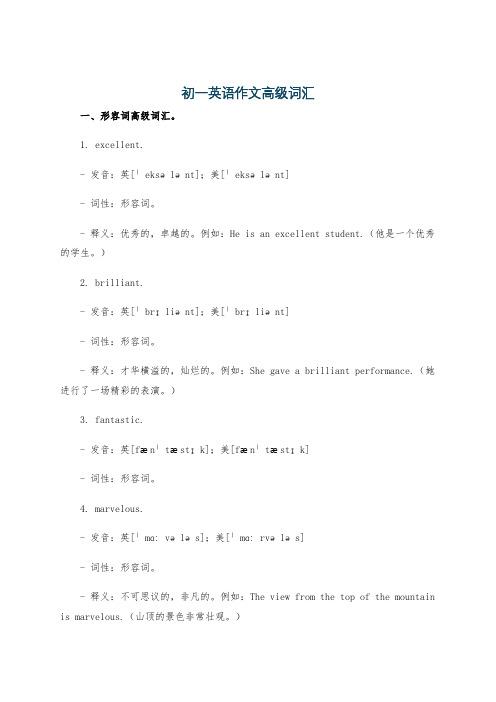
初一英语作文高级词汇一、形容词高级词汇。
1. excellent.- 发音:英[ˈeksələnt];美[ˈeksələnt]- 词性:形容词。
- 释义:优秀的,卓越的。
例如:He is an excellent student.(他是一个优秀的学生。
)2. brilliant.- 发音:英[ˈbrɪliənt];美[ˈbrɪliənt]- 词性:形容词。
- 释义:才华横溢的,灿烂的。
例如:She gave a brilliant performance.(她进行了一场精彩的表演。
)3. fantastic.- 发音:英[fænˈtæstɪk];美[fænˈtæstɪk]- 词性:形容词。
4. marvelous.- 发音:英[ˈmɑːvələs];美[ˈmɑːrvələs]- 词性:形容词。
- 释义:不可思议的,非凡的。
例如:The view from the top of the mountain is marvelous.(山顶的景色非常壮观。
)5. gorgeous.- 发音:英[ˈɡɔːdʒəs];美[ˈɡɔːrdʒəs]- 词性:形容词。
- 释义:华丽的,极好的。
例如:She wore a gorgeous dress.(她穿着一件华丽的裙子。
)二、副词高级词汇。
1. extremely.- 发音:英[ɪkˈstriːmli];美[ɪkˈstriːmli]- 词性:副词。
- 释义:极其,非常。
例如:It is extremely cold today.(今天极其寒冷。
)2. incredibly.- 发音:英[ɪnˈkredəbli];美[ɪnˈkredəbli]- 词性:副词。
- 释义:难以置信地,非常地。
例如:The movie was incredibly exciting.(这部电影非常令人兴奋。
)3. amazingly!- 发音:英[əˈmeɪzɪŋli];美[əˈmeɪzɪŋli]- 词性:副词。
初中英语作文的加分单词、词组及句子
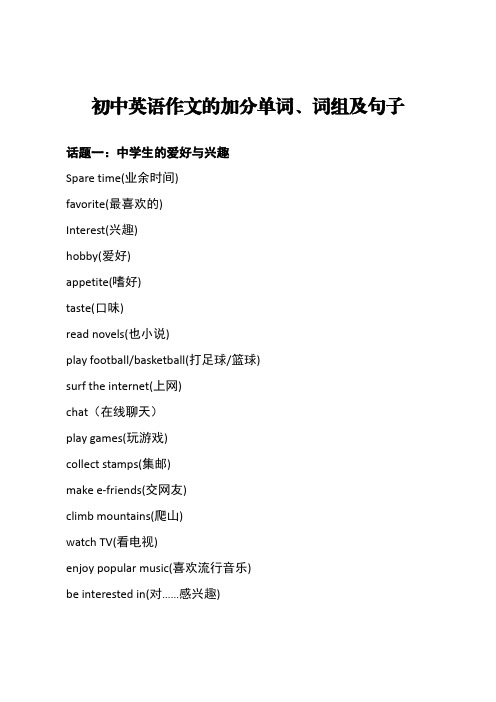
初中英语作文的加分单词、词组及句子话题一:中学生的爱好与兴趣Spare time(业余时间)favorite(最喜欢的)Interest(兴趣)hobby(爱好)appetite(嗜好)taste(口味)read novels(也小说)play football/basketball(打足球/篮球)surf the internet(上网)chat(在线聊天)play games(玩游戏)collect stamps(集邮)make e-friends(交网友)climb mountains(爬山)watch TV(看电视)enjoy popular music(喜欢流行音乐)be interested in(对……感兴趣)develop an interest in(在……方面发展兴趣) be fond of(喜欢……)be keen (喜欢……)have love for(喜爱……)have a taste in(对……有兴趣)话题二:劳动与劳动观念Work(工作)be at work(在工作)work hard(努力工作)produce(生产)worker(工人)labor force(劳动力)labor(劳动)voluntary labor(义务劳动)serve the people(为人民服务)heart and soul(全心全意)physical labor(体力劳动)mental labor(脑力劳动)labor viewpoint(劳动观念)labor Day(劳动节)workday(工作日)means of labor(劳动方式) honorable(光荣的)be devoted to(奉献于……)value(价值)earn money(赚钱)personal interests(个人利益)话题三:创建和谐社会harmonious(和谐的)friendly(友好的)civilized(文明的)honest(真诚的)credible (诚信的)be public-spirited(有公德心的) balanced(平衡的)be in order(有序的)peaceful(和平的)live in harmony(生活和谐) sustainable development(可持续发展) help each ether(互助)care for each other(互相关心)have deep love for (热爱)be concerned with (关心)build(创建)cherish(珍惜)take an active part in(积极参与)pay attention to social moral(讲究社会公德)protect the environment(保护环境)save energy(节省能源)No pains, no gains. 不劳无获can be achieved by hard wok. ……可以通过劳动获得It is honorable to … ……是光荣的It is difficult to find work in the present situation在当前形势下,很难找到工作If everyone … for others and the society, our world will be …。
初中英语作文词汇归纳总结
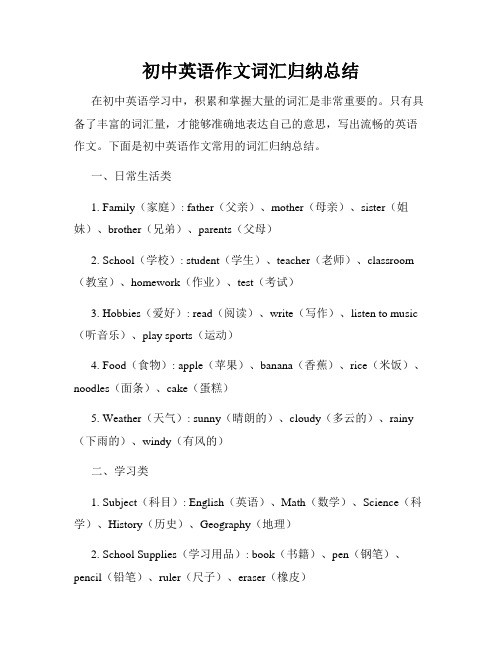
初中英语作文词汇归纳总结在初中英语学习中,积累和掌握大量的词汇是非常重要的。
只有具备了丰富的词汇量,才能够准确地表达自己的意思,写出流畅的英语作文。
下面是初中英语作文常用的词汇归纳总结。
一、日常生活类1. Family(家庭): father(父亲)、mother(母亲)、sister(姐妹)、brother(兄弟)、parents(父母)2. School(学校): student(学生)、teacher(老师)、classroom (教室)、homework(作业)、test(考试)3. Hobbies(爱好): read(阅读)、write(写作)、listen to music (听音乐)、play sports(运动)4. Food(食物): apple(苹果)、banana(香蕉)、rice(米饭)、noodles(面条)、cake(蛋糕)5. Weather(天气): sunny(晴朗的)、cloudy(多云的)、rainy (下雨的)、windy(有风的)二、学习类1. Subject(科目): English(英语)、Math(数学)、Science(科学)、History(历史)、Geography(地理)2. School Supplies(学习用品): book(书籍)、pen(钢笔)、pencil(铅笔)、ruler(尺子)、eraser(橡皮)3. Study(学习): learn(学习)、understand(理解)、review(复习)、memorize(记忆)、improve(提高)4. Exam(考试): prepare(准备)、score(得分)、pass(通过)、fail(失败)、nervous(紧张的)三、人物类1. Jobs(职业): doctor(医生)、teacher(教师)、engineer(工程师)、actor(演员)、singer(歌手)2. Character(性格): kind(友好的)、hardworking(勤奋的)、honest(诚实的)、helpful(乐于助人的)四、环境类1. Nature(自然): tree(树)、flower(花)、river(河流)、mountain(山)、lake(湖)2. City(城市): street(街道)、building(建筑物)、traffic(交通)、crowded(拥挤的)五、旅游类1. Places(地方): beach(海滩)、museum(博物馆)、park(公园)、mountain(山)、city(城市)2. Activities(活动): swim(游泳)、climb(爬山)、take photos (拍照)、sightseeing(观光)六、社交类1. Friendship(友谊): friend(朋友)、help(帮助)、share(分享)、trust(信任)、care(关心)2. Communication(交流): speak(说话)、listen(听)、express (表达)、conversation(对话)以上是初中英语作文常用的词汇归纳总结。
英语作文万能单词
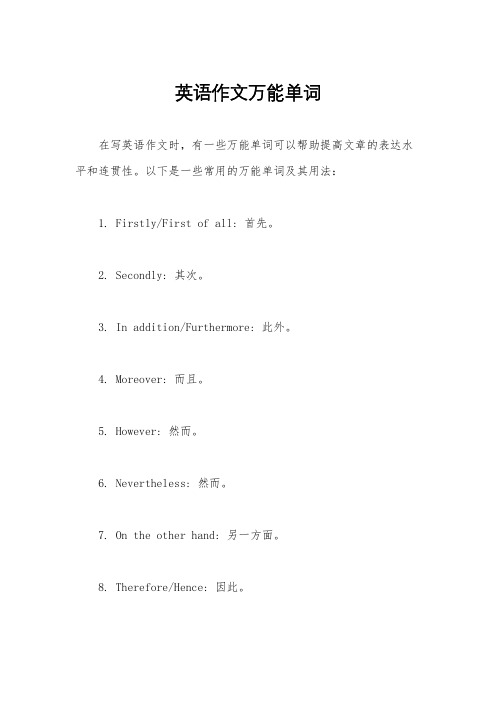
英语作文万能单词在写英语作文时,有一些万能单词可以帮助提高文章的表达水平和连贯性。
以下是一些常用的万能单词及其用法:1. Firstly/First of all: 首先。
2. Secondly: 其次。
3. In addition/Furthermore: 此外。
4. Moreover: 而且。
5. However: 然而。
6. Nevertheless: 然而。
7. On the other hand: 另一方面。
8. Therefore/Hence: 因此。
9. Consequently: 结果。
10. Furthermore: 此外。
11. In conclusion: 总之。
12. To sum up: 总结。
在写作时,可以巧妙地运用这些万能单词来连接句子和段落,使文章的逻辑结构更加清晰,表达更加流畅。
同时,还可以使用一些形容词和副词来丰富文章的词汇,使其更加生动有趣。
例如:1. Excellent: 优秀的。
2. Outstanding: 出色的。
3. Remarkable: 非凡的。
4. Furthermore, the excellent performance of the students in the competition demonstrates their outstanding abilities and dedication to their studies.5. Additionally, the remarkable progress made by the company in recent years highlights its commitment to innovation and excellence.总的来说,熟练运用这些万能单词可以帮助提高英语作文的表达水平,使文章更加连贯和生动。
常考的英语作文种类单词

常考的英语作文种类单词在英语写作中,掌握一些常见的作文种类及其相关词汇是非常重要的。
以下是一些常考的英语作文种类及其相关单词:1. 议论文 (Argumentative Essay)- Argument (论点)- Thesis statement (论点陈述)- Counterargument (反方观点)- Persuade (说服)- Evidence (证据)- Logical (逻辑的)2. 说明文 (Expository Essay)- Explain (解释)- Inform (通知)- Describe (描述)- Clarify (澄清)- Illustrate (举例说明)- Detail (细节)3. 叙述文 (Narrative Essay)- Story (故事)- Experience (经历)- Event (事件)- Character (人物)- Plot (情节)- Setting (背景)- Sensory details (感官细节)- Imagery (意象)- Vivid (生动的)- Metaphor (隐喻)- Simile (比喻)- Tone (语气)5. 比较和对比文 (Compare and Contrast Essay) - Similarities (相似之处)- Differences (不同之处)- Analogy (类比)- Contrast (对比)- Corresponding (相应的)6. 因果文 (Cause and Effect Essay)- Cause (原因)- Effect (效果)- Consequence (后果)- Factor (因素)- Influence (影响)- Result (结果)7. 过程分析文 (Process Analysis Essay)- Procedure (程序)- Step (步骤)- Method (方法)- Instruction (指导)- Sequence (顺序)- Technique (技术)- Define (定义)- Term (术语)- Classify (分类)- Characteristic (特征) - Instance (例子)- Synonym (同义词)9. 评价文 (Evaluation Essay) - Judge (判断)- Criteria (标准)- Quality (质量)- Value (价值)- Merit (优点)- Shortcoming (缺点)10. 信件 (Letter)- Address (地址)- Salutation (称呼)- Body (正文)- Closing (结尾)- Signature (签名)- Formal (正式的)11. 报告 (Report)- Research (研究)- Findings (发现)- Data (数据)- Summary (总结)- Recommendation (建议) - Objective (客观的)12. 摘要 (Summary)- Condense (浓缩)- Main points (主要点)- Brief (简短的)- Synthesize (综合)- Paraphrase (改写)这些作文种类及其相关词汇是英语写作中的基础,掌握它们可以帮助你更好地理解和构建你的作文。
英语作文常用的单词

英语作文常用的单词1. Introduction: 引入话题- Nowadays, 现今- Firstly, 首先- In recent years, 近年来- With the development of..., 随着...的发展 - It is widely acknowledged that..., 众所周知2. Body Paragraphs: 正文段落- Additionally, 另外- Furthermore, 进一步- Moreover, 而且- However, 然而- Nevertheless, 尽管如此- Consequently, 因此- As a result, 结果- For instance, 例如- On the other hand, 另一方面- In contrast, 与此相反- Similarly, 类似地- Likewise, 同样地3. Examples and Evidence: 例子和证据- For example, 例如- Such as, 比如- Take...for example, 以...为例- According to..., 根据...- It is reported that..., 据报道- Statistics show that..., 数据显示4. Conclusion: 结论- In conclusion, 总之- To sum up, 总结来说- In summary, 总的来说- Therefore, 因此- Thus, 因此- As a result, 结果- Hence, 因此- Ultimately, 最终5. Opinions and Views: 观点和看法- I believe that..., 我相信- It is my opinion that..., 我的看法是 - I am convinced that..., 我确信- I think that..., 我认为- In my view, 在我看来- From my perspective, 从我的角度看6. Transitional Phrases: 过渡短语- As a matter of fact, 实际上- In fact, 事实上- In addition, 另外- Besides, 除此之外- Furthermore, 进一步- Likewise, 同样地- On the contrary, 相反地7. Emphasis and Reiteration: 强调和重申 - Indeed, 的确- Notably, 值得注意的是- Particularly, 特别是- Especially, 尤其- Undoubtedly, 无疑地- Clearly, 显然8. Causation and Effect: 因果关系- Because, 因为- Since, 自从- Due to, 由于- Owing to, 由于- As a result of, 由于- Consequently, 因此9. Comparison and Contrast: 比较和对比- Compared with/to..., 与...相比- In comparison, 相比之下- While, 而- Whereas, 然而- On the one hand...on the other hand, 一方面...另一方面10. Conditional Sentences: 条件句- If, 如果- Unless, 除非- Provided that, 只要- In case, 如果- Suppose that, 假设11. Time and Sequence: 时间和顺序- Subsequently, 随后- Afterwards, 之后- Meanwhile, 同时- Eventually, 最终- Previously, 之前12. Place and Location: 地点- Here, 这里- There, 那里- Nearby, 附近- In the vicinity of, 在...附近 - At the same place, 在同一个地方13. Quantity and Amount: 数量和金额 - A large number of, 大量的- A small amount of, 少量的- Several, 几个- Numerous, 众多的- A great deal of, 大量的14. Purpose and Reason: 目的和原因- In order to, 为了- So that, 以便- For the purpose of, 为了...- Because of, 因为- Owing to, 由于15. Feelings and Emotions: 感觉和情绪 - Happy, 开心的- Sad, 悲伤的- Excited, 兴奋的- Disappointed, 失望的- Surprised, 惊讶的这些单词和短语是英语写作中常用的,可以帮助你构建清晰、连贯的文章。
英语作文常用的单词

英语作文常用的单词Certainly! Here's a list of commonly used words in English essay writing, categorized for clarity:1. Essay Structure Words:- Introduction: to begin, to introduce, to outline- Body: to discuss, to examine, to analyze, to argue, to illustrate, to demonstrate- Conclusion: to summarize, to conclude, to reiterate, to recapitulate2. Argumentative Words:- Claim: to assert, to contend, to maintain- Support: to substantiate, to corroborate, to validate- Oppose: to refute, to contradict, to challenge- Concession: however, although, despite, notwithstanding3. Descriptive Words:- Appearance: bright, dark, colorful, dull, elegant, plain - Emotion: happy, sad, excited, anxious, furious, delighted- Environment: serene, chaotic, bustling, tranquil, polluted, pristine4. Academic Words:- Theoretical: hypothesis, theory, principle, concept- Empirical: data, evidence, observation, experiment, study, research5. Temporal Words:- Time: currently, recently, traditionally, historically, in the past, in the future- Sequence: firstly, secondly, subsequently, finally, thereafter, meanwhile6. Quantitative Words:- Amount: few, several, many, numerous, vast, significant - Comparison: more, less, most, least, greater, smaller7. Modal Verbs:- Possibility: may, might, could, possibly- Necessity: must, should, ought to, necessarily- Ability: can, could, be able to8. Linking Words:- Addition: furthermore, moreover, in addition, also, as well as- Cause and Effect: therefore, thus, consequently, as a result, due to- Contrast: however, on the other hand, whereas, while, despite9. Evaluative Words:- Importance: significant, crucial, essential, vital, important- Quality: excellent, poor, outstanding, mediocre, satisfactory10. Certainty and Uncertainty:- Certainty: undoubtedly, certainly, surely, definitely - Uncertainty: perhaps, possibly, potentially, it seems, it appears11. Examples and Illustrations:- For instance: for example, such as, like, particularly, specifically12. Conclusion Words:- Summarizing: in summary, in conclusion, to sum up, overall, ultimatelyThese words are essential for constructing well-organized and coherent essays. They help to guide the reader through the structure of your argument, describe the subject matter accurately, and express your ideas clearly and effectively. Remember to use them appropriately based on the context of your essay.。
英语作文中常用的词汇初一
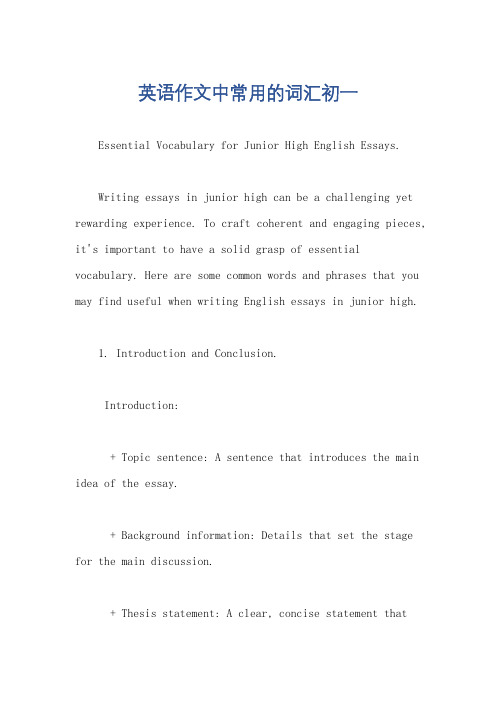
英语作文中常用的词汇初一Essential Vocabulary for Junior High English Essays.Writing essays in junior high can be a challenging yet rewarding experience. To craft coherent and engaging pieces, it's important to have a solid grasp of essential vocabulary. Here are some common words and phrases that you may find useful when writing English essays in junior high.1. Introduction and Conclusion.Introduction:+ Topic sentence: A sentence that introduces the main idea of the essay.+ Background information: Details that set the stage for the main discussion.+ Thesis statement: A clear, concise statement thatsummarizes the main argument or point of the essay.Conclusion:+ Summary: A brief recap of the main points discussed in the essay.+ Conclusion sentence: A final statement that ties up the essay and leaves a lasting impression on the reader.2. Description and Narration.Description:+ Adjectives: Words that describe nouns, such as "beautiful," "exciting," "interesting."+ Adverbs: Words that describe verbs, adjectives, or other adverbs, such as "quickly," "quietly," "really."+ Sensory details: Descriptions that evoke thereader's senses, such as "the sweet smell of flowers" or"the crisp feel of autumn leaves."Narration:+ Storytelling: Using words to create a narrative flow, such as "first," "then," "after that."+ Sequence of events: Organizing ideas in the order they happened, using words like "initially," "next," "finally."3. Argument and Persuasion.Argument:+ Claim: A statement that the writer believes to be true and wants to prove.+ Evidence: Facts, examples, or reasons that support the claim.+ Counterargument: An opposing viewpoint that thewriter acknowledges and may even refute.Persuasion:+ Appeal to logic: Using reason and evidence to convince the reader.+ Appeal to emotion: Evoking strong feelings in the reader to persuade them.+ Appeal to authority: Citing experts or authorities to add credibility to the argument.4. Cause and Effect.Cause: The reason or factor that leads to an effect.Effect: The result or outcome caused by a particular factor.Analyzing cause and effect: Examining how one event or action leads to another and discussing the implications.5. Comparison and Contrast.Comparison: Showing similarities between two or more things.Contrast: Highlighting differences between two or more things.Using transitional words: Words like "similarly," "in contrast," "on the other hand" to clearly show comparisons and contrasts.6. Organization and Coherence.Topic sentences: Opening each paragraph with a sentence that previews the main idea.Transition words and phrases: Linking ideas and paragraphs smoothly, such as "therefore," "in addition," "however."Conclusion: Bringing the essay to a logical end, summing up the main points, and leaving a lasting impression.Remember, these are just some of the vocabulary and techniques that you may find useful when writing essays in junior high. As you continue to practice and develop your writing skills, you will discover more words and strategies that work best for you. Good luck with your essay writing!。
初中英语作文必背单词
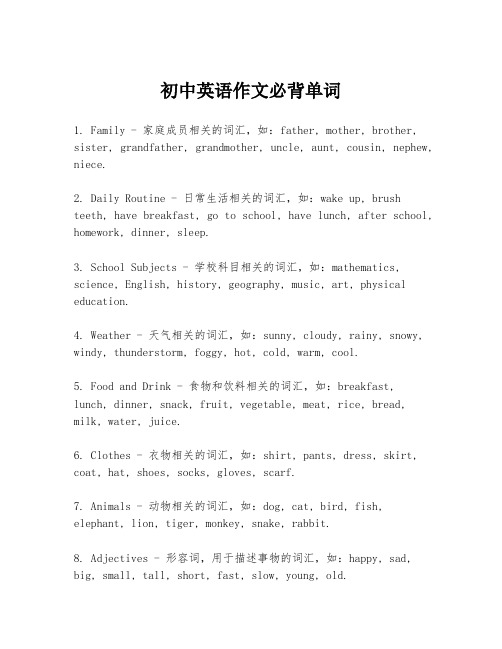
初中英语作文必背单词1. Family - 家庭成员相关的词汇,如:father, mother, brother, sister, grandfather, grandmother, uncle, aunt, cousin, nephew, niece.2. Daily Routine - 日常生活相关的词汇,如:wake up, brush teeth, have breakfast, go to school, have lunch, after school, homework, dinner, sleep.3. School Subjects - 学校科目相关的词汇,如:mathematics, science, English, history, geography, music, art, physical education.4. Weather - 天气相关的词汇,如:sunny, cloudy, rainy, snowy, windy, thunderstorm, foggy, hot, cold, warm, cool.5. Food and Drink - 食物和饮料相关的词汇,如:breakfast, lunch, dinner, snack, fruit, vegetable, meat, rice, bread, milk, water, juice.6. Clothes - 衣物相关的词汇,如:shirt, pants, dress, skirt, coat, hat, shoes, socks, gloves, scarf.7. Animals - 动物相关的词汇,如:dog, cat, bird, fish, elephant, lion, tiger, monkey, snake, rabbit.8. Adjectives - 形容词,用于描述事物的词汇,如:happy, sad, big, small, tall, short, fast, slow, young, old.9. Verbs - 动词,表示动作或状态的词汇,如:run, jump, swim, eat, drink, play, read, write, draw.10. Prepositions - 介词,用于表示位置、方向、时间等关系的词汇,如:in, on, at, under, over, behind, beside, between, before, after.11. Numbers - 数字,用于计数或表示顺序的词汇,如:one, two, three, four, five, six, seven, eight, nine, ten, first, second, third.12. Colors - 颜色,用于描述物体颜色的词汇,如:red, blue, green, yellow, black, white, purple, orange, brown, pink.13. Sports - 体育运动相关的词汇,如:soccer, basketball, volleyball, tennis, swimming, running, cycling, skiing, skating.14. Time - 时间相关的词汇,如:morning, afternoon, evening, night, today, tomorrow, yesterday, week, month, year.15. Places - 地点相关的词汇,如:home, school, park, library, supermarket, hospital, museum, zoo, beach, mountain.16. Transportation - 交通工具相关的词汇,如:car, bus, train, plane, bicycle, motorcycle, boat, subway.17. Feelings and Emotions - 情感和感觉相关的词汇,如:love, hate, like, dislike, happy, sad, angry, excited, bored, scared.18. Occupations - 职业相关的词汇,如:teacher, doctor, nurse, lawyer, engineer, artist, musician, scientist, farmer, pilot.19. Phrases - 常用短语,如:good morning, how are you, thank you, you're welcome, excuse me, I'm sorry, congratulations, happy birthday.20. Common Sentence Structures - 常用句型结构,如:I am, He likes, She has, They can, Do you want, What is this, Where are they, When will you go.这些词汇是初中英语作文中常见的基础词汇,掌握它们将有助于你更好地表达自己的想法和写作。
初中英语作文必备单词
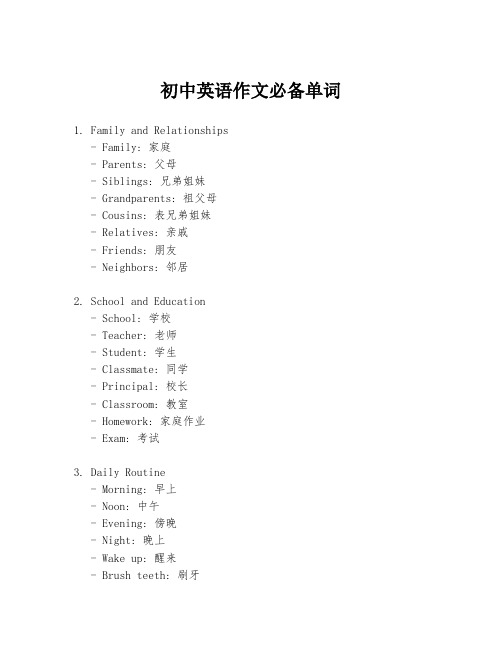
初中英语作文必备单词1. Family and Relationships- Family: 家庭- Parents: 父母- Siblings: 兄弟姐妹- Grandparents: 祖父母- Cousins: 表兄弟姐妹- Relatives: 亲戚- Friends: 朋友- Neighbors: 邻居2. School and Education- School: 学校- Teacher: 老师- Student: 学生- Classmate: 同学- Principal: 校长- Classroom: 教室- Homework: 家庭作业- Exam: 考试3. Daily Routine- Morning: 早上- Noon: 中午- Evening: 傍晚- Night: 晚上- Wake up: 醒来- Brush teeth: 刷牙- Eat: 吃- Sleep: 睡觉4. Food and Drink- Breakfast: 早餐- Lunch: 午餐- Dinner: 晚餐- Snack: 小吃- Fruit: 水果- Vegetable: 蔬菜- Meat: 肉- Drink: 饮料- Water: 水5. Weather and Seasons- Sunny: 晴朗的- Rainy: 下雨的- Snowy: 下雪的- Windy: 有风的- Spring: 春天- Summer: 夏天- Autumn: 秋天- Winter: 冬天6. Clothes and Accessories - Shirt: 衬衫- Pants: 裤子- Dress: 连衣裙- Shoes: 鞋子- Hat: 帽子- Jacket: 夹克- Socks: 袜子7. Hobbies and Interests - Reading: 阅读- Drawing: 绘画- Singing: 唱歌- Dancing: 跳舞- Playing sports: 运动 - Traveling: 旅行- Collecting: 收集- Gardening: 园艺8. Travel and Places- City: 城市- Country: 国家- Park: 公园- Zoo: 动物园- Museum: 博物馆- Beach: 海滩- River: 河流- Mountain: 山9. Feelings and Emotions - Happy: 高兴的- Sad: 悲伤的- Angry: 生气的- Excited: 兴奋的- Tired: 疲倦的- Bored: 无聊的- Surprised: 惊讶的- Scared: 害怕的10. Time and Dates- Year: 年- Month: 月- Day: 日- Week: 周- Today: 今天- Yesterday: 昨天- Tomorrow: 明天- Morning: 上午- Afternoon: 下午这些单词是初中英语作文中常见的词汇,可以帮助学生在写作时更准确地表达自己的想法和情感。
2024年初中1年级英语作文常用词(1563篇)

I need to finish this project by the end of the week to meet the deadline.
翻译:我需要在本周结束前完成这个项目,以赶上截止日期。
Can you help me draft the email?
翻译:你能帮我起草这封邮件吗?
翻译:你无法改变过去,但你可以塑造未来。专注于你今天能控制的事情,朝着你想要的生活努力。
I enjoy learning about different cultures when traveling.
翻译:我旅行时喜欢了解不同的文化。
Every person you meet is fighting their own battle. Be kind and compassionate, for you never know what someone else is going through. Your kindness might be the light that helps them through a dark time.
翻译:每一个你遇到的人都有自己的战斗要打。要友善和富有同情心,因为你永远不知道别人正在经历什么。你的善意可能是帮助他们度过黑暗时刻的光。
They are planning a wedding for next summer.
翻译:他们计划明年夏天举办婚礼。
Every day is a new opportunity to begin again. No matter what happened yesterday, today is a fresh start to make new decisions and take new actions.
- 1、下载文档前请自行甄别文档内容的完整性,平台不提供额外的编辑、内容补充、找答案等附加服务。
- 2、"仅部分预览"的文档,不可在线预览部分如存在完整性等问题,可反馈申请退款(可完整预览的文档不适用该条件!)。
- 3、如文档侵犯您的权益,请联系客服反馈,我们会尽快为您处理(人工客服工作时间:9:00-18:30)。
on Christmas Day 【单句翻译练习2】在每年的中秋节,中国人习惯吃月饼,赏月亮。
_______________________________________________________________________________ __________________________这本书是在十九世纪七十年代晚期写的。
___________________________________农历正月十五晚人们扭秧歌挑灯笼度元宵节。
_______________________________________________________________________________ _______________________________On mid-autum festival every year, the Chinese are used to eating moon- cakes and enjoying the moon.The book was written in the late 1870’s.On the night of the 15th of the 1st lunar month people celebrate the Lantern Festival by doing the yangko dance and raising Lanterns.三、“早、午、晚”的表达(一)泛指“早、午、晚”:①通常morning,afternoon,evening等词前用介词in + the。
②当这些词前后有一修饰限定的词作为定语,把它们限定为某一天早晨、下午或晚上时,介词in应改为on。
修饰限定词可以是介词短语、名词、形容词、定语从句等。
如:on a cold morning of December,2006。
③当morning, afternoon, evening前有this, that, yesterday, tomorrow等词修饰时,前不加任何介词。
如this morning在今天上午。
(二)表示“早、午、晚”的时间点用at。
如:拂晓时,at dawn在天刚亮的时候,at daybreak在半夜,at midnight在正午at noon(三)表示“在某年某月某日的上午/下午/晚上几点”,用“at + 小时+ on the morning / afternoon / evening +of +月份+ 日期的序数词+ 年份”写出。
如:在2009年2月10日上午九点半at half past nine on the morning of February 10, 2009【单句翻译练习3】周恩来总理于1976年元月上午九点五十七分因癌症在北京逝世,享年76岁。
_______________________________________________________________________________ _____________________________这个故事就发生在2006年元月23日的寒冷的下午。
_________________________________________________________________十月一日上午七点我们来到了天安门广场。
__________________________________________________________________Premier Zhou Enlai died of cancer at nine fifty-seven on January 8, 1976, in Beijing at the age of 76.?This story happened on a cold afternoon of January 23, 2006.We came to Tian An Men Square at seven o’clock on the morning of October,1st.四、时间的其它表达(一)表示“在前天、今天,明天、后天”:直接用the day before yesterday, today, tomorrow, the day after tomorrow, 其前不用任何介词。
(二) this, that, these, those, next, last等词修饰day, week, month, year, century等表示时间的名词时,其前不加介词。
(三) 表示“每隔…”的用法①表示“每隔一天(星期、月等)”:用“every other day/week/month”或“every second day/week/month”。
②表示“每隔…天(星期、月等)”:用“every + 序数词+ day/ week / month”或“every + 基数词+ days/weeks/months”。
③表示“每隔几天(星期、月等)”:用“every few days/weeks/months”【单句翻译练习4】我每隔两三个星期到北京去出差。
__________________________________________________________________这项工程务必要在在明年的这个月完成。
_________________________________________________________________I went to Beijing on business every third or fourth week.This project should be completed this month next year.“Everybody in this country should learn how to program a computer…because it teaches you how to think.”–Steve Jobs“这个国家的每个人都应该学习如何写计算机程序…...因为它教你如何思考。
”——史蒂夫-乔布斯I was 13 when I first got access to uh…a computer.第一次接触到啊…...一台计算机时,我13岁时。
My parents bought me a Macintosh in 1984 when I was 8 years old.我的父母亲在1984年,我8岁时给我买了一台麦金塔计算机。
I was in 6th grade.我六年级的时候。
I learned to code in college.我在大学学写程序。
学校不会教你的事Freshman year, first semester, umm…Intro to Computer Science.大一,第一个学期,嗯…计算器概论。
I wrote a program that played Tic-Tac-Toe.我写了个软件会玩井字游戏。
I think it’s pretty humble at beginnings. I think the first program I wrote asked things like “What’s your favorite color?”or “How old are you?”我认为一开始非常粗糙。
我想我写的第一个程序会问像是“什么是你最喜欢的颜色?”或“你几岁?”的问题。
I first learned how to make a green circle, and a red square appeared on the screen.我首先学会如何让在屏幕上画出一个绿色圆圈和一个红色正方形。
The first time I actually had something come up and say, “Hello, world!”And it…I made a computer do that, which was astonishing.我第一次让电脑说出:“Hello, world!”的时候,那种感觉非常神奇。
Learning how to program didn’t start off as wanting to learn all of computer science or umm…or trying to master this discipline or anything like that. It just started off because I wanted to do this one simple thing: I wanted to make something that was fun for myself and my sisters, and I wrote this little program…and then basically just added a little bit to it. And then when I needed to learn something new, I looked it up, either on a book or on the internet, and then I added a little bit to it.学习如何写程序并非从想要学会所有计算机科学,或试着精通这门学问或任何像那样的事情开始。
它(facebook)这就开始了,只因我想做这件简单的事情:我想为我自己和我姊妹们做出某个有趣的东西,然后我写出这小程序…接着基本上就是给它加上一点东西。
然后当我需要学点新东西时,我不是从一本书就是从网络上查询,接着我给它加点东西。
It’s really not…unlike kinda playing instrument or something, or…or…you know, or playing sports. It starts out being very intimidating, but you kinda get the hang of it over time.编程并不像演奏乐器或是参加体育运动。
开始可能会觉得比较南入门,但你花一些时间就能掌握技巧。
Coding…It is something that can be learned. And I know it can be intimidating…A lot of things are intimidating. But ugh…you know, what isn’t?写程序…...那是一个可以学会的东西。
